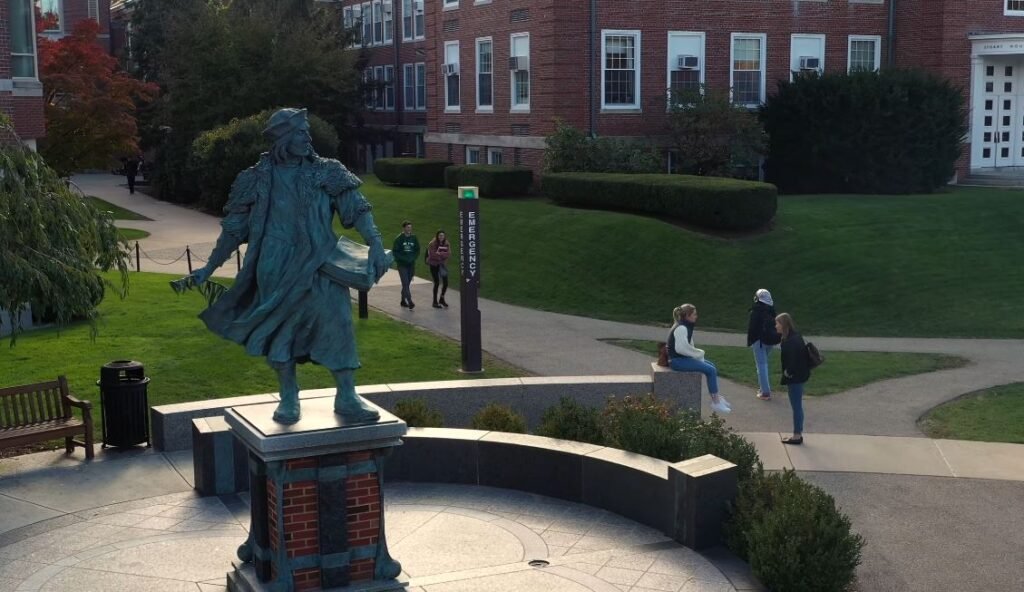
Boston College Law School has established a reputation for combining a strong dedication to moral leadership with academic accuracy. From its humble beginnings in a building in downtown Boston in 1929, it has expanded to a remarkably well-equipped 40-acre campus in Newton. The Jesuit origins of the school are more than just ceremonial; they give the curriculum a mission-driven culture that inspires students to see the practice of law as a means of advancing society rather than just their careers.
Graduates carry the training’s characteristics into powerful positions in international advocacy, public policy, and corporate boardrooms. They are constantly sought after by employers due to their ability to handle difficult situations with integrity as well as their legal knowledge. This is demonstrated by the employment rate, which hovers around 98% a year after graduation. This demand is in line with the school’s consistently high first-time bar passage rate of 93.82%, which is significantly higher than that of many peer institutions.
Boston College Law School – Key Facts & Figures
| Attribute | Detail |
|---|---|
| Established | 1929 |
| Location | Newton Centre, Massachusetts, U.S. |
| Parent Institution | Boston College (Private Jesuit University) |
| Campus Size | 40 acres |
| Dean | Odette Lienau |
| Enrollment (2024) | 634 students |
| Faculty | 82 full-time, 138 part-time |
| USNWR Ranking (2025) | 25th in Best Law Schools |
| Bar Passage Rate (2024 first-time) | 93.82% |
| Student-Faculty Ratio | 6:1 |
| Median LSAT (2024) | 167 |
| Median GPA (2024) | 3.80 |
| Employment Rate (10 months post-grad) | 97.7% |
| Median Private Sector Salary | $145,000 |
| Median Public Service Salary | $51,000 |
| Website | https://www.bc.edu/lawschool |
BC Law has proven over the years to be flexible, changing its curriculum to reflect changing legal environments. For students hoping to work across jurisdictions, its global partnerships—from Paris to Beijing—and Semester-in-Practice International Program are especially advantageous. Students who study international business disputes in Dublin or work with Chinese legal scholars acquire viewpoints that are remarkably similar to those of elite practitioners handling cross-border cases.
History has demonstrated the tenacity of BC Law. The program was infamously difficult when the first class started in 1929, and half of the cohort failed to finish it. But in just three years, the school became one of the select few in New England to receive accreditation from the American Bar Association. Another important turning point was the 1940 admission of women, which established an inclusive atmosphere long before it was a requirement in higher education.
In 1975, a change occurred with the relocation to the Newton campus. An exceptionally clear research environment has been created by the state-of-the-art facilities, which include a law library with over half a million volumes and the Daniel R. Coquillette Rare Book Room. With the Boston College Law Review achieving its highest-ever ranking of 16th nationally, these resources have significantly raised the caliber of student scholarship.
Academic success alone does not satisfy BC Law. Students can gain first-hand experience defending tenants from eviction, arguing for asylum seekers, or negotiating contracts for start-ups through more than 100 clinic and externship opportunities. When it comes to graduating lawyers who are prepared for practice, this experiential approach is incredibly effective. Additionally, it enhances the school’s standing as a producer of graduates who possess a sophisticated fusion of social awareness and legal expertise.
Thought leaders whose influence goes far beyond the campus are on its faculty roster. For instance, Mary Sarah Bilder has advised Hollywood filmmakers and influenced the national conversation on constitutional history. The creation of the Consumer Financial Protection Bureau under Patricia A. McCoy’s direction serves as a reminder of the school’s ability to have a significant impact on policy at the highest levels. In addition to teaching doctrine, these faculty members also practice the law in the real world, giving students examples of how the law can change lives.
With tuition at $69,600 and an estimated total annual cost of over $91,000, attending BC Law is unquestionably expensive. But for recent graduates, especially those going into private practice, where beginning salaries can be much higher than the national average, the investment frequently pays off handsomely. A comforting counterpoint is that over 88% of students receive financial aid, making this prestigious education surprisingly accessible to many.
The legacy of BC Law is also linked to its flexibility. A particularly creative method of preparing students for a changing legal profession has been demonstrated in recent years by the incorporation of courses on artificial intelligence, climate policy, and international trade. The school makes sure its graduates are not only prepared for the workforce but also for the industry by utilizing its network of former students, which includes judges, CEOs, and public servants.
Boston College Law School acts as a bridge in many respects, connecting the demands of contemporary practice with the rigorousness of classical legal education. It has established itself as one of the most prestigious legal institutions in the country thanks to strategic alliances, creative initiatives, and a persistently moral mission. Aspiring attorneys who want to achieve both professional success and the opportunity to have a lasting social impact can find that BC Law provides an education that is incredibly valuable, incredibly successful, and steeped in a tradition that never stops inspiring.











